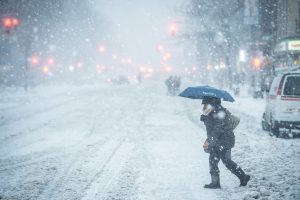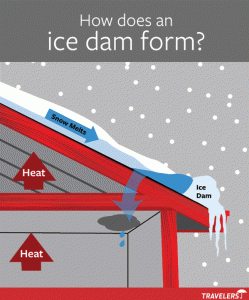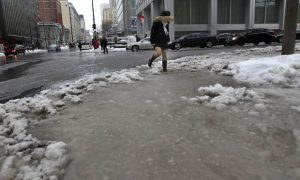Winterizing your Business - Property & Premises
You work hard to build and maintain your business. That’s why it’s important to ensure you’re protected from all potential losses – especially when they’re avoidable.  Whether we experience a mild winter or harsh storms, the cold season can cause property damage and safety concerns. By preparing your business premises in advance, you can reduce winter’s impact on you, your staff and your customers.
Whether we experience a mild winter or harsh storms, the cold season can cause property damage and safety concerns. By preparing your business premises in advance, you can reduce winter’s impact on you, your staff and your customers.
Slip and Fall
Winter conditions are a leading cause of slip-and-fall claims on business property insurance so it’s important to pay particular attention to the procedures required to maintain your premises during the winter season.
Outdoors
Ensure your contract for outdoor snow removal or winter maintenance (salting, sanding) clearly identifies the responsibilities of each party.
- Establish the criteria to trigger snow removal or other maintenance of your walkways and parking lots.
- Maintain a log to document all weather conditions as well as maintenance activity.
- Confirm understanding of insurance clauses or “hold harmless” provisions.
- Pay special attention to areas where ice may accumulate or when there is a freeze/thaw cycle.
Inside
- Install suitable rugs and mats in high traffic areas to reduce the risk of slips and falls.
- Post signs to indicate wet floor areas.
- Provide a dedicated area for visitors and customers to leave their winter clothing and boots.
- Clean and dry floors regularly throughout the day.
Property damage
There are a number of potential hazards faced by building owners during the winter – from roof collapse to frozen pipes – and most can be prevented with a
proper maintenance plan.

Ice damming
Ice damming occurs when heat from inside a structure melts the snow on the roof causing water to run down, under the blanket of snow to the edge of the roof where colder conditions cause it to freeze again, forming ice. In time, a ridge of ice is created along the lower edge, or eave, of the roof. The water may also flow into the gutter where it can freeze and form a block of ice that grows back over the gutter and forms the ice dam at the eave. If ice dams aren’t removed, water collects behind them and is forced under shingles or spills over to form icicles. This can result in costly damage, including wet ineffective insulation; stained interior finishes, and weakened structural wood members. The formation of icicles can also pose a hazard to pedestrians walking beside the building.
Changes in the daily temperature in the winter may also contribute to the problem. As temperatures climb during the day, more snow melts and accumulates behind the ice dam. At night, lower temperatures may freeze the water.
To reduce your risks from ice damming, consider the following tips:
- Check your eaves regularly for ice dam formation and clear any blockage as quickly as possible.
- Remove hanging icicles as quickly as possible.
- Maintain a “cold” roof by:
• sealing all bypasses
• ensuring your attic is well-insulated and well ventilated
Frozen fire sprinkler systems
Freezing of wet pipe sprinkler systems occur most frequently because of a lack of adequate heat. The following checklist can help prevent your wet pipe systems from freezing during cold weather:
- Close doors, windows, and vents when not in use or if resulting drafts allow freezing air to contact sprinkler piping.
- Provide adequate heat to maintain the temperature at not less than 5°C (41°F) in the vicinity of sprinkler piping. Particular attention should be given to piping in attics, stairways, under floor areas, above ceilings, shipping rooms, and similar out-of-the-way areas where low temperatures might occur.
- Ensure pipes are heated and insulated properly, where wet-pipe sprinkler piping may be exposed to outside temperatures, e.g. when it’s run between two
buildings. - Drain the sprinkler system if you’re aware it may be exposed to freezing temperatures, for example, when a plant is being temporarily shut down and the
heating system shut off. - Check the anti-freeze solution (if the sprinkler system is so equipped), to ensure it has the proper proportions of antifreeze and water per the National
Fire Protection Association (NFPA) 13.
Around the outside

Before the first snow fall, walk around your premises and note areas which could be affected by snow and ice. Specifically:
- Keep all sewers and drains clear and unblocked.
- Ensure fire hydrants are accessible and not blocked by snow.
Emergency Response Plan
Maintain a winter emergency response plan and update it annually. At the very least, the plan should include:
- Emergency contact numbers and information.
- Procedures to follow in the event the building is damaged or inaccessible.
- Procedures to follow in the event someone is injured while on the property
Acumen Insurance Group is a full service, independent Insurance brokerage. Their enthusiastic staff of licensed insurance professionals are ready to provide you the absolute best solutions for your insurance needs. They are able to customize insurance policies to suit specific client needs. For more information, email info@acumeninsurance.com.